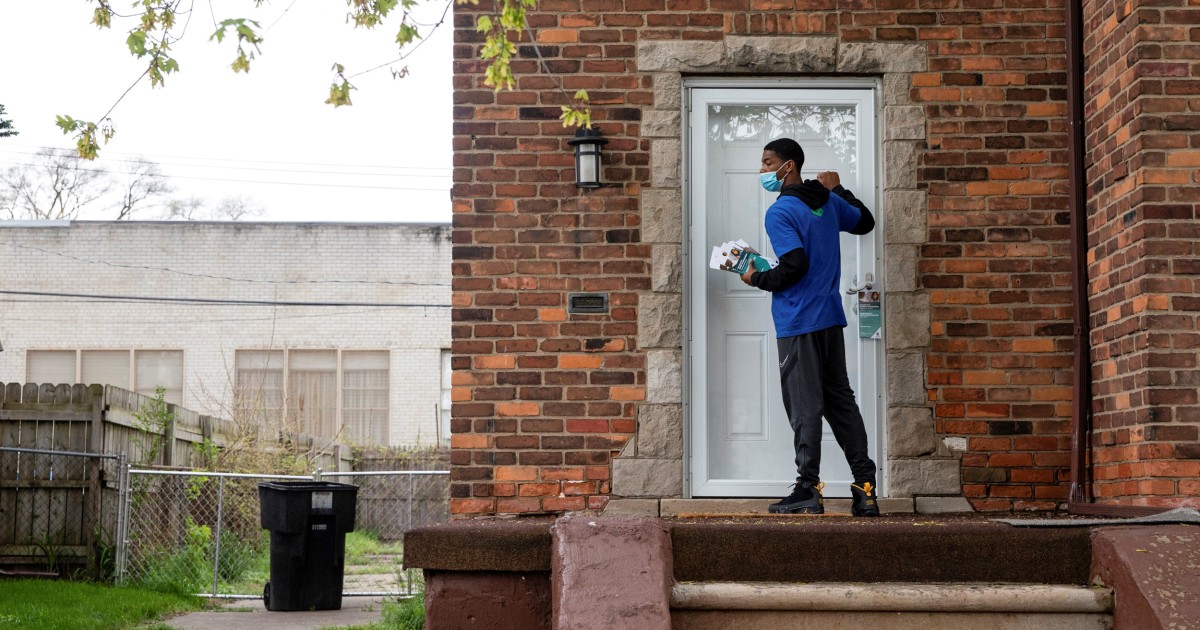You are here
Outreach workers hit the streets to encourage hesitators to get vaccinated change minds
Primary tabs
 As vaccinations drop, outreach workers hit the streets to change minds Volunteers across the country are responding to people's fears, coaxing the hesitant and removing obstacles for those who want to get vaccinated. NBC News
As vaccinations drop, outreach workers hit the streets to change minds Volunteers across the country are responding to people's fears, coaxing the hesitant and removing obstacles for those who want to get vaccinated. NBC News DETROIT — Tanika Knighton knows how devastating Covid-19 can be: Her 62-year-old father died of the disease last spring, and she and her husband both got very sick last year.
But she hasn’t been vaccinated. And when a canvasser approached her on a street in northwest Detroit recently offering information on getting a shot, she took his flyer but didn’t seem convinced.
“I don’t know too much about it,” Knighton, 46, said as the canvasser — part of a new city-run door-knocking operation — continued down the block. The working-class neighborhood, which is predominantly Black, has one of the lowest vaccination rates in Detroit, a city where fewer than a third of residents have received at least one shot.
Knighton said she didn’t trust the vaccine. "It's something that was put together really fast and, quite frankly, I'm afraid," she said.
That brief encounter was among many that NBC News reporters observed across the country last week, offering a glimpse at the massive challenge that cities and public health officials face as they try to meet President Joe Biden’s goal of getting at least one shot to 70 percent of the adult population by July 4. So far, about 59 percent of adults have received at least one shot.
Although the vaccines are widely available, demand is sliding. Some people are reluctant to get the shots, while others have not been able to because of their work schedules, child care obligations, a lack of transportation or other obstacles, researchers say.
While the waning demand cuts across broad portions of the population, the consequences could fall hardest on people at the highest risk of infection and death. Covid-19 has disproportionately affected Black and Hispanic people, but they’re getting vaccinated at lower rates than white people, the Kaiser Family Foundation found.
Public health authorities have responded by shifting efforts away from mass vaccination sites and focusing on communities with the lowest vaccination rates. This hyperlocal approach, using census-style canvassing operations, education campaigns and mobile vaccination events, hinges on making the shots easy to reach — and helping the hesitant change their minds. In some places, officials seem willing to try just about anything: free beer in New Jersey, crawfish giveaways in New Orleans, complimentary baseball tickets in New York, $100 savings bonds in West Virginia, $50 gift cards in Detroit — and a $1 million lottery in Ohio.
The most successful efforts will result from talking to people who have not been vaccinated and using those conversations to develop “bespoke solutions” designed for particular neighborhoods, said Harald Schmidt, an assistant professor of medical ethics and health policy at the University of Pennsylvania. ...
Even if the initial conversations unvaccinated people have with outreach workers don’t change their mind on the spot, it could cause them to think more about their decision — a potential first step. And the conversations will teach community health centers how best to reach vulnerable groups, including public housing residents, farmworkers and the homeless, to help with access issues like language barriers.
“Tailored community outreach is what we need to be doing now,” Schmidt said. ...



Recent Comments